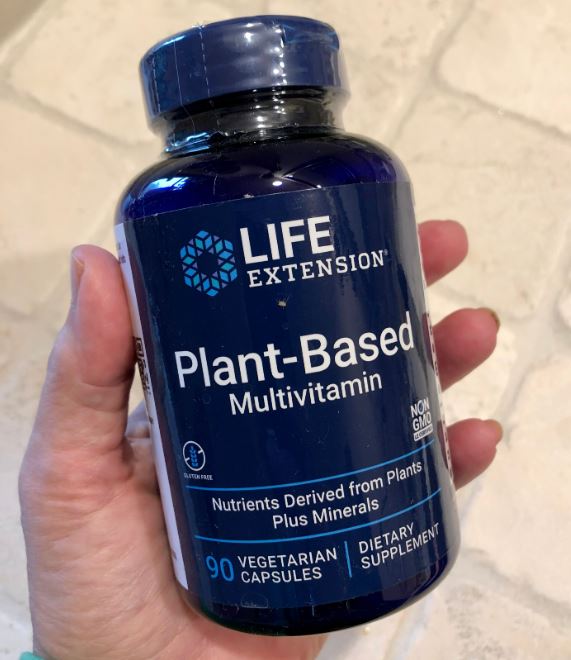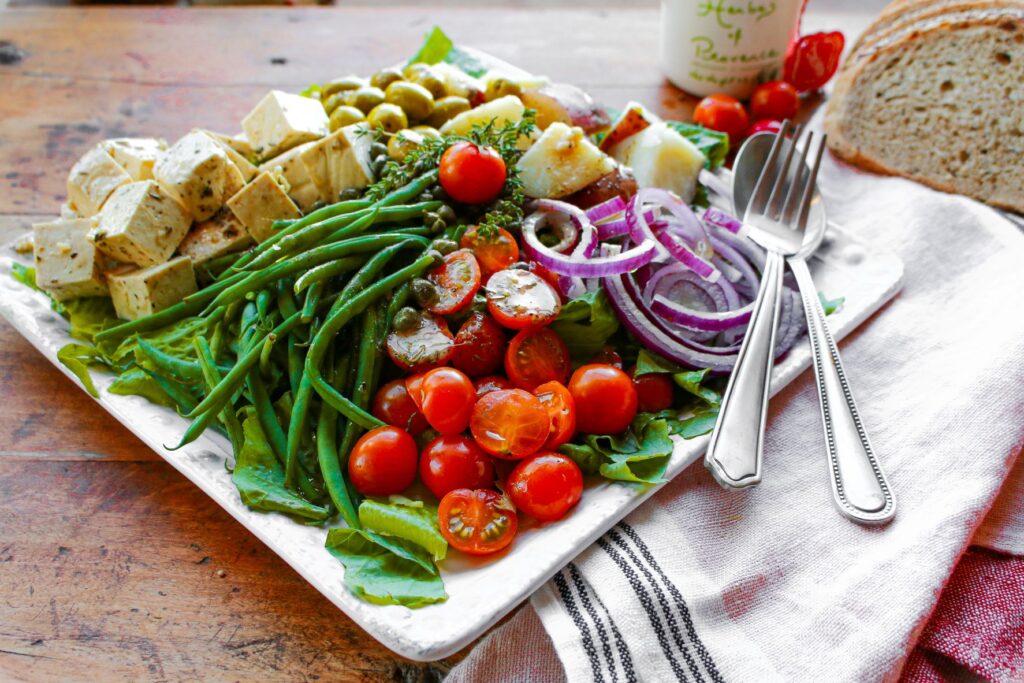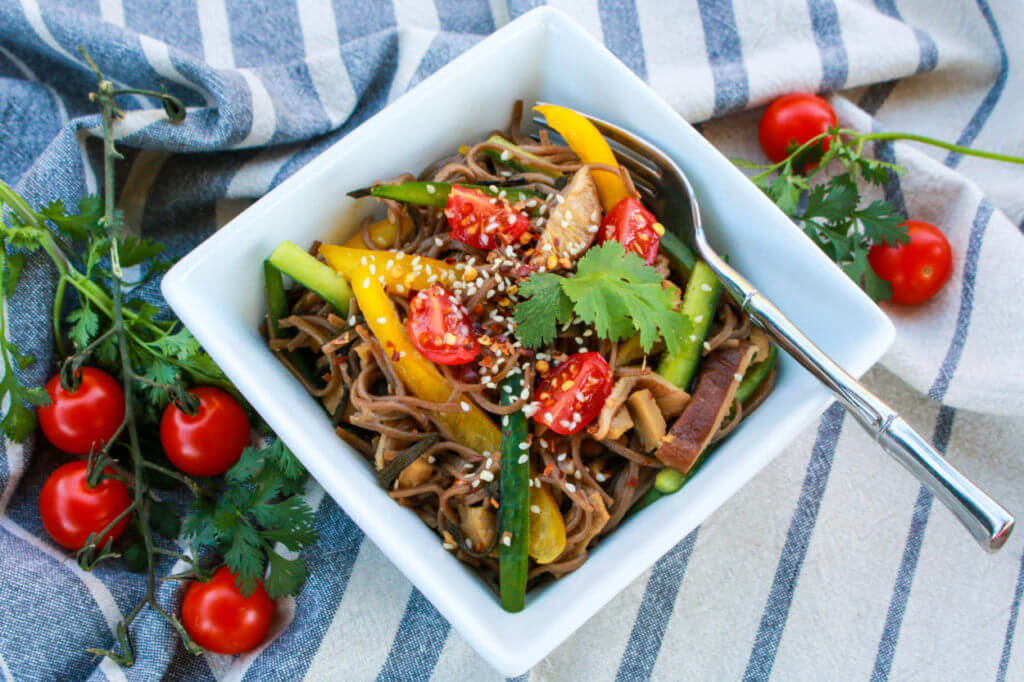
Wondering how to eat a balanced vegan diet? Learn how to get all your nutrients on your vegan diet plan with this helpful vegan diet guide.
As a registered dietitian for more than 25 years and a plant-based dietitian for 15 years, I know a thing or two about plant-based nutrition. Not so long ago, a vegan diet was cause for concern among the health care community because of potential nutrient risks or deficiencies. Flash forward to today, and a body of scientific evidence points out that a well-planned vegan diet can not only can meet your nutrient needs, it can offer a range of benefits, such as a lower risk of heart disease, certain types of cancer, and type 2 diabetes. However, the emphasis here is on a “well-planned” or balance vegan diet plan.
What is a balanced vegan diet?
Let’s start with the basics. The good news is that a vegan diet rich in whole plant foods—whole grains, beans, lentils, tofu, nuts, seeds, vegetables, fruits, and herbs—is packed with nutrients. Which is why studies show that plant-based diets tend to be richer in vitamins A, C, and E; thiamin, riboflavin, folate, and magnesium than non-vegetarian diets. Yet, even if you’re eating a diet rich in these plant foods, you can still fall short on a few nutrients of concern: protein, omega-3 fatty acids, vitamin B12, calcium, vitamin D, iron, zinc, and iodine. And if you’re eating a junk food vegan diet—Fries, brownies, and soda—then you’re chances of meeting those needs falls even further. Here’s a look at the most important nutrients you need to make sure you get in your diet every day. Download my free Go Vegan Toolkit to get more resources on how to eat a balanced vegan diet here.
How to Get Your Nutrients with a Balanced Vegan Diet

Protein
Protein is an essential nutrient with important functions, including maintaining muscle and bone mass, and supporting the immune system. It’s entirely possible to meet one’s nutrient needs for protein with plant-based proteins, which tend to have a better protein package—the protein they provide is packaged with nutrients such as fiber, heart-healthy fats, vitamins, minerals, and phytochemicals. While animal proteins are considered high quality because they provide all 9 essential amino acids in a good balance, many plant-based proteins may fall short on one or more essential amino acids. Once it was a popular notion that vegetarians needed to “combine” different plant proteins at one meal to create a “complete” protein, but it is no longer considered necessary. A healthy balanced diet with a variety of whole plant foods should provide adequate amino acids throughout the day. Lysine is typically the limiting amino acid for many plant-based food sources, so it’s important that vegans get good sources daily, such as tofu, tempeh, soyfoods, lentils and seitan.
Studies show that the typical protein intake among vegans is adequate, although some vegan women may have marginal intake. Vegan protein sources include legumes, soy foods, nuts, and seeds. Additionally, whole grains and vegetables can provide notable levels of protein to the diet. Learn more about getting plant protein here and check out these five plant protein hacks here.
Protein recommendation per the Dietary Reference Intakes Report:
- Infants: 1.5 g/kg/day
- 1-3 years: 1.1 g/kg/day
- 4-13 years: 0.85 g/kg/d
- Adults: 0.8 g/kg body weight
Note:
- Vegans: may require additional protein (about 10% more) to compensate for the reduced digestibility of plant-based proteins
- Older adults: may benefit from slightly more protein—1.0-1.6 g/kg daily

Omega-3 Fatty Acids
Given that vegans do not consume fish, intake of the omega-3 fatty acids eicosapentaenoic acid (EPA) and docosahexaenoic acid (DHA)—linked with heart health, brain development, and other benefits—may be low. However, vegan diet patterns are typically rich in the omega-3 fatty acid alpha-linolenic acid (ALA). ALA may be converted to EPA at levels generally less than 10%, with conversion to DHA at even lower levels. Conversion rates may improve when omega-6 fatty acid consumption is lower. Some experts recommend more ALA may be needed for vegans; sources include soy, flax, walnuts, and hemp.
While there is no current recommendation for EPA and DHA, the Dietary Guidelines suggests about 250 mg per day on average. Marine algae supplements, rich in EPA and DHA, may be considered to supplement the diet.
Vegans can have low omega-3 intakes and blood levels, and in some cases older vegans have close to no DHA in the blood. While it’s not clear if those levels are harmful, supplementing with 200-300 mg DHA every 2-3 days to provide insurance that you are getting enough may be a good idea. For vegans who want the same DHA levels as non-vegetarians, 300 mg per day is suggested.
ALA recommendations per the Dietary References Intake:
- 0-12 months: 0.5 g/d
- 1-3 years: 0.7 g/d
- 4-8 years: 0.9 g/d
- 9-13 years females: 1.0 g/d
- 9-13 years males: 1.2 g/d
- 14 years and older females: 1.1 g/d
- 14 years and older males: 1.6 g/d
- Pregnancy: 1.4 g/d
- Lactation: 1.3 g/d
Note: Some experts recommend more ALA may be needed for vegetarians and vegans—approximately 2 g per day.
Some of the best vegan omega-3 supplements include Deva Vegan, Ovega-3, Nordic Naturals Algae Omega, Life Extension Vegetarian DHA, and Testa Omega-3. Learn more about getting plant-based sources of omega-3 fatty acids here.

Vitamin B12
This is likely the most important nutrient for vegans to pay attention to. There is no unfortified plant food that provides significant levels of vitamin B12. According to data presented at the International Congress on Vegetarian Nutrition at Loma Linda University in 2013, 30-86% of vegetarians and 43-88% of vegans are B12 deficient. Vitamin B12 has many important functions, including metabolism, red blood cell formation, and central nervous symptom maintenance. Deficiency may result in megaloblastic anemia, as well as central nervous system symptoms (i.e. memory loss, disorientation).
According to the Vegetarian Nutrition Dietetic Practice Group (VNDPG), all vegans should be screened for B12 deficiency, and B12 must be part of the daily diet to meet needs. Status is best determined by measuring serum levels of homocysteine, methylmalonic acid or holotranscobalamin II. It’s a good idea to take a dietary supplement providing at least 100% DV for vitamin B12.
The VNDPG suggest that vegan adults should take 250 mcg/day—which is much higher than the DRI recommends because supplements may be poorly absorbed. While foods fortified with vitamin B12, such as nutritional yeasts, breakfast cereals and plant-based milks, can help, a consistent, reliable intake of this micronutrient must be part of the daily diet to meet needs.
Vitamin B12 recommendations per the Dietary Reference Intakes Report.
- 0-6 months: 0.4 mcg/d
- 6-12 months: 0.5 mcg/d
- 1-3 years: 0.9 mcg/d
- 4-8 years: 1.2 mcg/d
- 9-13 years:1.8 mcg/d
- 14 years and older: 2.4 mcg/d
- Pregnancy: 2.6 mcg/d
- Lactation 2.8 mcg/d
Note: Vegan adults should take 250 mcg/day (VNDPG)
Learn more about getting enough vitamin B12 in your diet here. There are many vitamin B12 supplements available, but one of the best B12 vitamin supplements is here.

Calcium
Important for bone health and muscle and nerve function, vegans often consume lower levels of calcium. Of particular concern is risk for osteoporosis; some studies have shown lower bone mineral density among vegans. Although, it’s important to note that many other bone-protective nutrients—potassium, magnesium, and vitamin K—are plentiful in vegan diets.
Calcium food sources include calcium-fortified foods (plant-based milks, orange juice), tofu made with calcium sulfate, leafy greens, broccoli, butternut squash, beans, almonds, and oranges for vegans. Calcium may be poorly absorbed from spinach and Swiss chard due to high oxalate content. Supplements may be considered to help you meet needs.
Calcium recommendations per the Dietary References Intake Report:
- 1-3 years: 700 mg/d
- 4-8 years: 1,000 mg/d
- 9-18 years: 1,300 mg/day
- 19 -70 year males: 1,000 mg/day
- 19-50 years females: 1,000 mg/day
- 51 years and older females: 1,200 mg/d
- 70 years and older males: 1,200 mg/d
- Pregnancy and Lactation: 14-18 years: 1,300 mg/d; 19-50 years 1,000 mg/d
One of my favorite vegan calcium supplements is available here. Learn more about getting plant-based calcium in your diet here.

Vitamin D
Vitamin D has been highlighted for its role in health protection, with notable functions in bone health, immune health, nervous system, and muscle function. The EPIC-Oxford study found a stepwise change in vitamin D levels, from meat eaters, fish eaters, vegetarians, and vegans—with the lowest levels in vegans. Vegans must rely on mushrooms exposed to light, fortified products, such as orange juice, plant-based milk, and cereals; sunlight exposure, and supplements. One of the best vitamin D supplements is available here. Learn more about getting vitamin D on a plant-based diet here.
Vitamin D recommendations per the Dietary References Intake Report:
- 0-12 months: 10 mcg/d
- 1-70 years: 15 mcg/d
- 70 years and older: 20 mcg/d

Iron
Found in the hemoglobin of red blood cells, iron is necessary for oxygen transport through out the body, in addition to other important functions, including immunity and DNA synthesis. The body can store iron and increase absorption when the stores drop. Heme iron (from animal sources) is absorbed better than non-heme iron (from plant sources). Interestingly, some research points out that high heme intake may be linked to increased risk of chronic disease.
Although more research is needed, studies suggest that vegans tend to have adequate iron stores, though children and women may be at risk for deficiency. Sources of iron for vegans include grains, legumes, leafy greens, tofu, and enriched cereals. Due to reduced bioavailability of iron, it’s recommended that vegetarians and vegans consume 1.8 times the RDA for iron. You can enhance the absorption of iron by soaking, sprouting, fermenting and cooking beans, grains and seeds. In addition, the presence of vitamin C with iron sources can increase its absorption level, and cooking foods in an iron skillet can increase iron intake. Phytates, calcium, and polyphenols (in tea, coffee, and cocoa) can inhibit the absorption.
Iron recommendations per the Dietary References Intakes Report:
- 0-6 months: 0.27 mg/d
- 6-12 months: 11 mg/d
- 1-3 years: 7 mg/d
- 4-8 years: 10 mg/d
- 9-13 years: 8 mg/d
- 14-18 years females: 15 mg/d
- 14-18 years males: 11 mg/d
- 19 years and older males: 8 mg/d
- 19-50 years females: 18 mg/d
- 51 years and older females: 8 mcg/d
- Pregnancy: 27 mg/d
- Lactation: 14-18 years: 10 mg/d; 19-50 years: 9 mg/d
Note: Vegans should consume 1.8 times the RDA for iron, due to reduced bioavailability.

Zinc
This important mineral has roles to play in the immune system and structure of DNA. Studies show that some vegans have slightly lower zinc levels, though more research is needed among free-living adults in developed countries. Zinc may be found in nuts, whole grains, soy, and beans. However, due to the presence of inhibitors in plant sources, bioavailability may be diminished. It is recommended that vegans consume 50% more than the current DRI recommends for zinc.
Zinc recommendations per the Dietary References Intake:
- 0-6 months: 2 mg/d
- 6 months – 3 years: 3 mg/d
- 4-8 years: 5 mg/d
- 9-13 years: 8 mg/d
- 14-18 years: females 9 mg/d
- 14 and older: males 11 mg/d
- 19 and older females: 8 mg/d
- Pregnancy: 14-18 years 12 mg/d; 19-50 years 11 mg/d
- Lactation: 14-18 years 13 mg/d; 19-50 years 12 mg/d
Note: Vegans should consume 50% more than the current DRI recommends for zinc.

Iodine
Iodine is used in the production of thyroid hormones, which control metabolism and other important body functions. Little research has been done on the status of iodine among vegetarians and vegans, although a recent study of Boston area vegetarians and vegans found that they were at risk for low iodine intake. Iodine may be found in iodized salt, sea vegetables, fruits, and vegetables. Sea vegetables contain varying levels of iodine—sometimes extremely high levels. And fruits and vegetables contain varying levels based on the soil and fertilizer with which they were grown. Some plant foods, such as cruciferous vegetables, soybeans, and sweet potatoes contain naturally occurring goitrogens, which may counteract high iodine intake. Supplemental iodine may be considered for people at risk for low iodine status.
Iodine recommendations:
- 1-8 years: 90 mcg/d
- 9-13 years: 120 mcg/d
- 14 years and older: 150 mcg/d
- Pregnancy: 220 mcg/d
- Lactation: 290 mcg/d
For more on nutrients and supplements, check out:
Getting Choline on a Vegetarian and Vegan Meal Plan
What are the Best Supplements for a Vegan Diet?
How to Get Vitamin B12 on a Vegan Diet
This post contains affiliate links, read more here.
